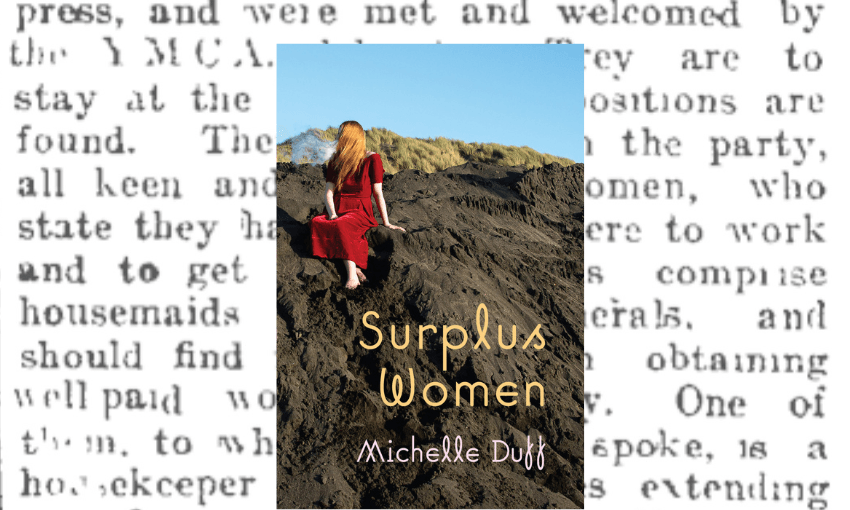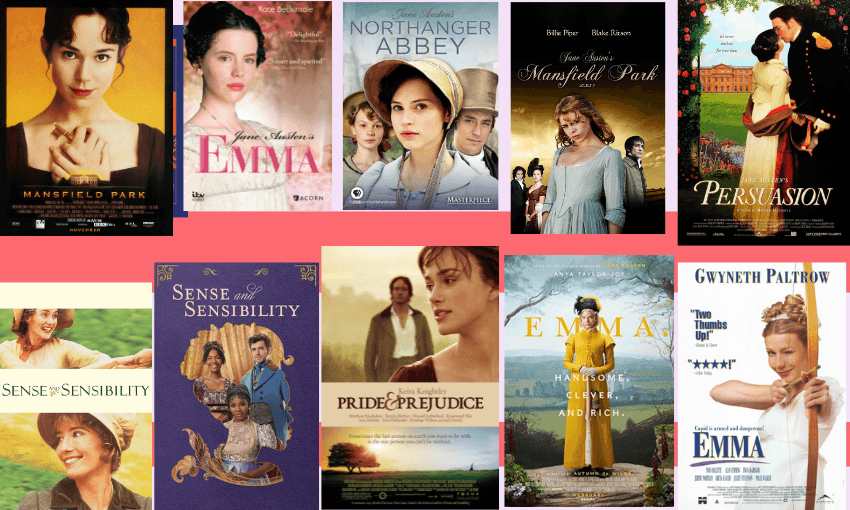The discovery that thousands of British women were brought out to Aotearoa as servants – considered ‘surplus’ to the empire’s requirements at home – propelled journalist Michelle Duff’s new short fiction collection, which explores how women’s bodies are valued.
Milk
It is the month after I have my first baby. I’m sitting on the couch watching the clock. The leaves blow past on the deck outside but that makes no sense because I’m underwater. I may have been here for days. I can breathe and the baby can breathe but the minute hand is obstinate in its stillness and time only really starts when my husband gets home. I’m still bleeding and when I close my eyes and try to sleep the milk drips from my body and soaks the sheets.
Witches
It is 2022, and I’m standing in the middle of a riot. People are yelling, they are tearing up the ground and throwing it at the police. There is burning. A child’s playground. They are so angry, they have been incited to violence: Jacinda is a witch, she is a cunt. At work I read their words, I see their images, they jump off the page and fly down my throat and get stuck somewhere deep inside. Nanaia Mahuta with no eyes, made inhuman, women are whores, cockroaches. Eve ate the apple and the rest is history.
The prime minister resigns, and tradwives are trending.
Breathe
I’m driving my youngest child through Newtown to childcare. It’s a parent-led co-operative and they really care about the kids: ie. they don’t force them to eat mouldy food or yell at them and lock them in tiny rooms or leave them in dirty nappies or fail to report physical abuse or penalise you financially if you’re running 15 minutes late or build their gigantic centres next to railway tracks in industrial areas and quantify the quality of the baby’s care by every dollar they can make. I visited 12 other centres before I found this, one of the good ones.
I read Joanna Kidman’s essay ‘On the night a baby died’, where she talks about being a young wāhine Māori on the benefit in Newtown in the 1980s, raising a baby. It was difficult, with moments of beauty and connection. That was before the welfare state came crashing down and now it’s much harder for single mothers, she writes. I think about my friend whose ex hasn’t paid any child support for 17 years and is given free rein by the tax department. Her son is brilliant. He loves theatre and dreams of a university degree.
I write a dozen articles about child support. Carmel Sepuloni changes the rules so single parents on the benefit can receive the money they’re owed instead of having it swallowed up by the state.
My friend, now working, never sees a cent.
I think it might be time to take a break from journalism.
Whakapapa
Ko wai ahau? He uri ahau nō ngā iwi o Kotirana me Ingarangi.
My grandfather on my dad’s side came over from Scotland on the SS Hororata, aged four, in 1928, with his mother, Joan Binnie, my great-grandmother. The journey took seven weeks. I once vomited over the side of the Awatere in a three-metre swell. How did my great-grandmother feel, travelling from the other side of the world with her young son, and why did she do it?
Not all the babies made it. My great-great-grandmother, Emily Cooper, came over from England with an earlier wave of settlers, in 1874, on the Schiehallion, with her daughter. Her child, also called Emily, died on board, three days after her second birthday.
I’m trying to write short stories, which apparently means trying to make sense of where I, Pākehā writer of fiction, come from. To trace back some of this patriarchal lineage, maybe? To figure out what kind of stories I can tell, when I’m not narrating those of others?
I take the number 3 bus to Wellington Station and walk up Molesworth St to the Alexander Turnbull library, where I’m let into a cool, odourless room. In the online catalogue I have found a series of sketches of the Hororata while berthed in the Wellington Harbour, done by a woman named Irene Atherton in 1921. Now I’ve requested the items and I’m here, the paper rough in my hands, holding this piece of history.
The drawings are a bit shit. I’m a little disappointed. I guess everyone needs to start somewhere. But on the back of the page are the addresses of four women, in Newtown. I turn the paper over and peer at the scrawled lettering, as if it could jump off the page and speak. Who were these women? Did they all travel over on the boat together, learning how to draw, smoking elegant cigarettes like Kate Winslet and dreaming of utopia?
Smoke
It’s 1917, and British Colonial Office Under-Secretary Leopold Amery is tasked with the business of maintaining the domination of the empire at home and abroad. He is a troubled man. There has just been a war, where many lives were lost. Now there are too many of the other ones, what are they called? Women. Yes. They’re surplus to requirements. In fact, that’s how they’re referred to. Surplus women.
“Wasted resources, fated to husbandless, childless, unsatisfied lives, and liable to distress and discontent,” Amery says, presumably stroking his beard or some other body part. (We know what Amery said thanks to the diligent work of feminist historians, including Katie Pickles and her article Empire Settlement and Single British Women as New Zealand Domestic Servants during the 1920s.) He turns to a crony, winking knowledgeably. “Their salvation lies in the colonies, where an overabundance of men promises them social purpose as wives and mothers.”
Over the next five years, 4500 women travel to Aotearoa New Zealand on the assisted immigration scheme to become domestic servants. They’re referred to as “good British stock,” shipped over to fill the shortage of help in the colony. They travel under the cloak of the Society for the Settlement of British Women, attracted with a free third-class passage and a stipend of two pounds. Upon arrival, they stay at YWCA hostels in Auckland and Wellington.
A 1927 report on a delegation of new migrants notes: “A fine type, nearly all young, from 17-25 years of age and very eager to take advantage of the opportunities offered them in this country. They are attractive in appearance generally.”
It was actually the second wave of recruitment. About 32,000 single women came to Aotearoa in an earlier wave between the 1850s and 70s, writes historian Charlotte Macdonald in the book A Woman of Good Character. “Young women were recruited as new settlers in the expectation that they would, at some point, become wives and produce the next generation – a generation that would be New Zealand-born.”
This history has largely been overlooked, due to definitions of “work” and the fact men wrote most of it. But women were doing domestic and reproductive work, Macdonald says. Their role was to uphold the “morals” of the new colonial society, and to breed.
Free
In the book My Hand Will Write What My Heart Dictates, editors Frances Porter and Charlotte Macdonald write about the importance of letters in revealing the private experiences of women, to allow us to understand their lives in a deeper way than what was said on the public record — bearing in mind, women in the 19th century didn’t have much of a voice.
Their names weren’t in newspapers, on land deeds, or bank cheques: around 13 signatures on Te Tiriti o Waitangi were from wāhine Māori, to the chagrin of Pākehā men, who saw women as chattels and didn’t understand the Te Ao Māori view, which was that women were equals.
But women did write, for themselves, in journals, in waiata, and in letters to their families and friends. Of their letters, Porter and Macdonald write: “They reveal the unsettling currents that ran through individual lives, and the widespread upheaval that occurred…as two very different societies came into contact with one another.”
In an era where women had limited control over their bodies, their money, their social status and where they lived, writing was a way of keeping account.
Ripples
I request the shipboard diaries of two settler women, Jessie Hamilton and Eleanor D’Arcy, and take them into the National Library’s reading room. I am transported into a world of sea and cloud, of “nothing to be seen as far as the eye can reach, but little white crested waves.” As they pull out of Southampton, England, Eleanor, who is from Glasgow, notes: “The boat is going very smoothly. It feels like going down the Clyde,” and also, a little spitefully, “I don’t care for the English houses or scenery.”
On board there is a “Scottish corner,” where cards and fiddles are played, and long, boring stretches of time with nothing to do but hope for the appearance of an albatross or dolphin. Sometimes the entry is a recollection of what they ate that day, or where they sailed.
At first it’s fascinating, but as the entries go on I find myself getting frustrated. Where is the tea? I want to hear every little detail, to know what they were thinking during this huge and terrifying adventure, but so much is missing from the page. I start feeling annoyed at Jessie and Eleanor, with their ridiculously elaborate handwriting and their beautiful but controlled prose. But, honestly. What had I hoped to find? The way women wrote back then was different: passions weren’t stated outright, the language was more formal, the women’s relationship with themselves and the way they expressed their emotions was more restrained.
But the stories were still there: in the words they used, and in the silences.
Magic
And so I started writing, and the women started to come.
They came slouching in, T-shirts hanging off a shoulder, bangles clanking; they came reluctantly, or entered from a side door, and some didn’t really want to be seen at all while others were LOUD and had Things To Say. Over the course of my writing, they helped to show me what it means to grow up in Aotearoa New Zealand, the forces that shape women and girls here, the way we all think about ourselves and each other. They pulled me by the hand into the past, giggling; and hollered at me from the future while putting on their mascara and hopping on one foot while pulling on a boot; and they made me laugh, a lot, because they were very funny and outrageous and sometimes mean and lovely.
I had a really good time meeting them, my surplus women, and I hope you do too.
Hope
“In a small way, these women sought passages to a better world. Did they find it? Were the modest hopes which prompted them to part with all they knew and sail to the other side of the world realised?” Macdonald writes at the end of her book.
“A satisfactory answer is probably impossible to offer.”
Surplus Women by Michelle Duff (Te Herenga Waka University Press, $35) is available to purchase from Unity Books. Michelle Duff is talking about her book with The Spinoff’s Claire Mabey on Wednesday April 23, 12.30pm at Unity Books Wellington.


